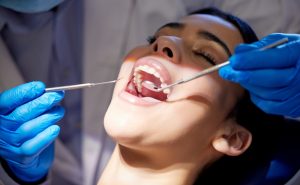What kind of toothbrush do you use? If you’re a stickler for an old-fashioned, non-electric toothbrush, then you usually have three choices: soft, medium, or hard bristles. At the Parkcrest Dental Group, our general dentistry experts know that everyone has their preferences when it comes to oral hygiene, from the firmness of the toothbrush bristles to the flavor of toothpaste you use.
But, how much difference does the softness or firmness of your bristles make? Is one or the other good or bad for your teeth or gums? The Parkcrest Dental Group takes a look at if it really makes a difference.
Related Post: Parkcrest Dental Group: Toothbrushing Tips And Techniques
Soft, Medium or Hard – Which One Works?
Whenever you’re shopping for a new toothbrush, you’re confronted with a lot of different options. However, the main question that the Parkcrest Dental Group hears when it comes to the humble, regular toothbrush is whether they should use one with soft, medium or hard (sometimes written as “firm” on packaging) bristles. Does it really matter?
Actually, it does. The type of toothbrush bristle strength you use has more of an effect than you’d think — and probably a different one, too. Many people, even now, assume that a medium or firmer bristled brush is going to do a better job at removing food and built-up plaque. This is true, but it’ll also do a better job at gradually wearing away the enamel on your teeth and damaging your gums.
The more abrasive the bristles on your toothbrush are, the more they’re going to scrub away at the enamel — which is a vital protective layer on your teeth. Couple this with pushing your gums back from your teeth, causing them to recede, and over an extended period of time, you’re going to end up with very sensitive, potentially loose teeth.
Soft bristles, applied with proper technique, have been found to not remove significantly less build-up than firmer options, while also reducing the stress they put on your teeth and gums.
Related Post: Pediatric Dentistry: Choosing The Right Toothbrush For Your Child
Proper Brushing Technique
When you brush, the way you do it is a lot more important than how strong the bristles of your brush are. As long as you replace your toothbrush every three months, and brush correctly and regularly, you won’t miss out on any of the benefits of brushing.
People who lean towards medium or firmer brushes also tend to scrub harder, which can make the side effects even worse. While you should brush thoroughly, you don’t need to brush aggressively.
You should brush in circular motions with the bristles angled to your gum line, and use gentle, massaging strokes rather than furious scrubbing. When it comes to proper brushing, the time you spend doing it is more important than how much pressure you apply. If you’re not sure your technique is up to scratch, you can always ask your dentist at the Parkcrest Dental Group.
Related Post: Tips From Parkcrest Dental: Benefits Of An Electric Toothbrush
Why So Many Options?
If soft bristles will do, why are there still other options available? Put simply, people will always have their preferences. As long as medium and firm bristles sell, you’ll see them on the shelves — although you might have noticed it’s a little harder these days to find firmer bristled brushes than it once was. There are also still certain situations — such as cleaning traditional dentures — in which firmer bristles can be used without causing damage.
Regular Brushing and Checkups with the Parkcrest Dental Group
The most important part of brushing your teeth is that you stick to it. Brushing your teeth at least twice a day remains one of the most effective ways to avoid more extensive dental procedures. But, if you’re looking for a local dentist in Springfield, MO for help, contact the Parkcrest Dental Group today.





